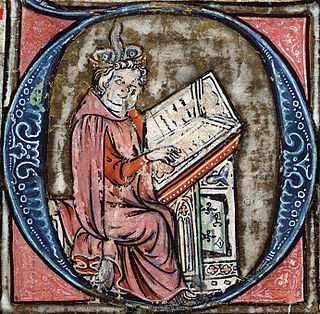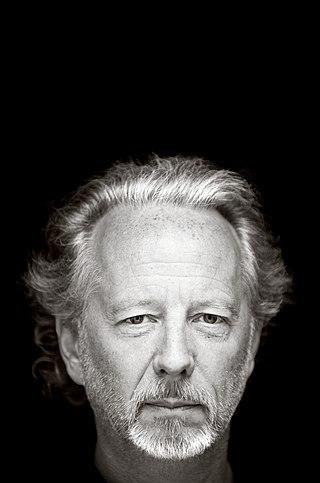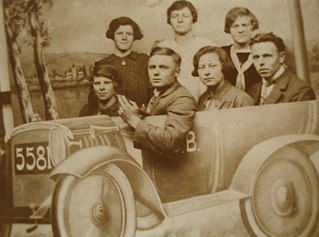
"Hebban olla vogala", sometimes spelled "hebban olla uogala", are the first three words of an 11th-century text fragment written in Old Dutch. The fragment was discovered in 1932 on the back of the end-leaf of a manuscript that once belonged to the cathedral priory of Rochester, Kent, now Oxford, Bodleian Library, MS Bodley 340. The manuscript contains a collection of Old English sermons by Ælfric of Eynsham. The Dutch text is found on fol. 169v and probably dates to the late 11th century. It was long considered to represent a West Flemish variant of Old Low Franconian, although more recent research shows that it also displays significant influence from Old English.

Jacob van Maerlant was a Flemish poet of the 13th century and one of the most important Middle Dutch authors during the Middle Ages.

Cyrillus Gustave Emile "Cyriel" Buysse was a Flemish naturalist author and playwright. He also wrote under the following pseudonyms: Louis Bonheyden, Prosper Van Hove and Robert Palmer.
Ward van Osta is a Belgian historian and etymologist. He is a member of the Koninklijke Commissie voor Toponymie en Dialectologie.

Johan Michiel Dautzenberg was a Belgian writer. Professionally he was successively secretary, clerk, teacher, private tutor, and bookkeeper.

Herman Louis Cesar Teirlinck was a Belgian writer. He was the fifth child and only son of Isidoor Teirlinck and Oda van Nieuwenhove, who were both teachers in Brussels. As a child, he had frail health and spent much of his time at the countryside in Zegelsem, with his paternal grandparents. He was nominated for the Nobel Prize in Literature six times.

Stefan Hertmans is a Flemish Belgian writer. He was head of a study centre at University College Ghent and affiliated researcher of the Ghent University. He won the Ferdinand Bordewijk Prijs in 2002 for the novel Als op de eerste dag.
Willem Maurits Roggeman is a Belgian poet, novelist and art critic.

David t'Kindt (1699–1770), architect, practised his profession mainly in Ghent, Belgium. His work is mainly in the Rococo style and includes the following buildings:

Raymond De Belser, pseudonym Ward Ruyslinck, was a Belgian writer. He is the son of Leo De Belser and Germaine Nauwelaers. His father was a librarian at an oil company, and Ward Ruyslinck grew up in a Roman Catholic family. During the Second World War, the family moved to Mortsel.

Ferdinand Van der Auwera, pseudonym Fernand Auwera was a Belgian writer. His fragile health during his youth and its impact on his life (solitude), had an effect on his first literary work.

Paul de Wispelaere was a Flemish writer.
Maurits Gysseling was an influential Belgian researcher into historical linguistics and paleography. He was especially well known for his editions and studies of old texts relevant to the history of the Dutch language, and also for his very detailed analyses of historical place-names and their probable origins.

The Royal Flemish Academy for Dutch Language and Literature is an institution focused on the study and promotion of the Dutch language in Flanders. It is the Dutch-speaking counterpart of the Académie royale de langue et de littérature françaises de Belgique and one of Belgium's numerous academies.

Jan Vaerman (1653–1731) was a Flemish mathematician.

Gabriëlle Demedts was a Flemish Belgian poet. She was a sibling of André Demedts. In 1934 she wrote her first poems and in 1937 she published her first work "Een gevangene zingt". As a young child she was struck by Poliomyelitis which has determined the rest of her life. In a book about the Declercq family, one can read that some of Demedts’ poems have been inspired by life-changing events in her life and that of the Declercqs. She wrote, for instance, '’Rustig lied’' and '’Lage tonen'’ after a love break-up of her friend Valentine Declercq, or '’Zomer’' (Summer) when Valentine was severely ill and dying. Later, she also wrote a poem, '’Ik heb gedaan...'’, when Ernest Constant Declercq, Valentine’s father and a close friend of Gabrielle Demedts’ parents, had died.
Gerard Isaäc Lieftinck, known in print as G.I. Lieftinck, was a Dutch academic specialising in medieval European manuscripts.
Events in the year 1638 in the Spanish Netherlands and Prince-bishopric of Liège.

Léonard Willems (1864–1938) was a Flemish philologist from Brussels, Belgium, who was active in academic circles in Ghent.
Stephanus Gerardus Axters (1901–1977) was a Belgian scholar with a particular interest in the history and literature of Christian mysticism.














